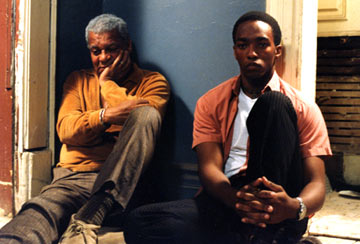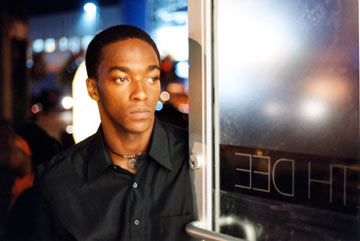

The more things change, the more they stay the same. Brother to Brother takes a look at the life of a black gay man. Growing up black in America can be hard enough, growing up gay is arguably more difficult. Both have been chronicled in film before, but nobody has ever seriously tackled the struggles of being black and gay. For Perry (Anthony Mackie, She Hate Me, The Manchurian Candidate), who is both black and gay, he finds himself isolated from nearly everybody. His father recently discovered his sexual orientation, and countered by throwing him out of the house. In college he faces some not-so-subtle discrimination in his black history class. Although he has friends, he feels like a pariah.
Then he meets Bruce Nugent (Roger Robinson, Flodder 2, Who's the Man?). Bruce, a friend of poet Langston Hughes, was an integral figure in the Harlem Renaissance. Nugent was black and gay in a time where being one or the other was infinitely more dangerous than it is today. And Nugent was an actual historical figure. Perry and his friends attend poetry slams, and Bruce recites to them one night on a street. Perry later discovers who Bruce is, and begins a hesitant friendship with him. By nature, Perry is extremely wary about everything, and is afraid that Bruce wants to rack up another conquest.
Rodney Evans makes his feature length writing and directorial debut with Brother to Brother. It is an interesting premise that suffers a bit from slow pacing, and a restrained performance from Mackie. Through Bruce, Perry relives the lives of Nugent, Hughes, and other black artists. Evans shows Perry and the viewer the vibrancy of these black artists in a series of extended flashbacks. Evans introduces historical characters quickly, and does not provide much context about who they were or what they accomplished. It's not clear if he did this on purpose, but for people with little to no knowledge it seems like a parade of people who are named, then seen sparsely. Nugent became the first black homosexual to publish poetry from that specific point of view. It is much more interesting than what happens in the present with Anthony. Although at times Mackie lets Perry show his emotion, for the most part he is unreadable, almost robotic. Evans does let Mackie show his rage through his art at some points, but for the most part, he is too passive.
Evans wants to use Bruce to show Perry that one can 'live' as a gay black man. Bruce brings the past to life by bringing Perry to actual places where historical events occurred. He is the person who will eventually rekindle Perry's connection to the real world. Perry doesn't care because he doesn't see anything worth caring about. Mackie portrays Perry as someone who just seems bored. The difference is miniscule but crucial. By getting it wrong, Mackie (who was great in She Hate Me) changes to Perry character into somebody who, instead of being internally conflicted, is generally uninteresting. Unfortunately, this eventually transposes itself onto the film.